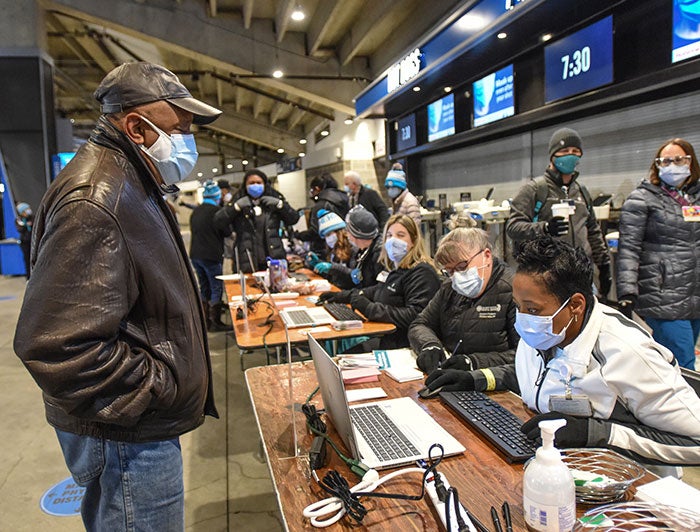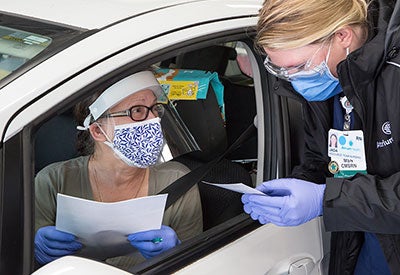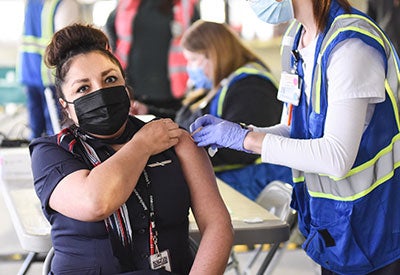Atrium Health: A Multipronged Approach to Reduce Barriers and Promote Vaccine Readiness
Atrium Health has worked with new partners to roll out mass vaccination events, roving units and smaller vaccination events to reduce barriers to access.

Photos courtesy of Atrium Health.
When COVID-19 vaccines started rolling out across the United States, the leadership team at Atrium Health began having conversations about how to vaccinate everyone in the communities it serves. The health system, based in Charlotte, N.C., developed a strategy that includes mass vaccination events, mobile vaccination teams, community vaccination clinics, drive-through vaccination sites and more. By building on trusted relationships with community groups and working with new partners, Atrium Health has vaccinated more than 300,000 people, while also promoting vaccine readiness and reducing barriers to access.
The Approach
Atrium Health has 42 hospitals with care locations across North Carolina, South Carolina and Georgia. The health system serves 7.8 million people in both urban and rural communities. About 40% of its patient population is rural, which is twice the national average for most health systems.
When the COVID-19 pandemic began, the health system — like other hospitals and health systems across the country — had to adopt a “public health infrastructure” to develop and spread general messaging about COVID-19 safety. According to Ruth Krystopolski, Atrium Health senior vice president, population health, the health system had been working with community-based partnerships for the past four to five years. Atrium Health teams had built trusted relationships with churches and other community groups, which was used as a “springboard” for masking, COVID-19 testing and, finally, vaccination. “We had a strong foundation to start with,” she said.
For COVID-19 vaccination efforts, Atrium Health created a vaccine equity task force, which focused on addressing vaccine readiness early on as well as reducing barriers to access. A COVID-19 dashboard tracks who has been vaccinated by race, ethnicity, age, location and other demographics. Kinneil Coltman, Atrium Health senior vice president and chief community and external affairs officer, explained, “Based on demographics, we can see if we’re undervaccinating or overvaccinating specific populations so that we can guard against disparities. [The dashboard] allows us to be incredibly data-driven with our vaccine model.”
Activities and Events
Atrium Health’s multipronged approach has included:
- mass vaccination events — the first events, at Charlotte Motor Speedway and Bank of America Stadium, vaccinated more than 36,000 people;
- mobile vaccination teams that are going into underserved neighborhoods and rural areas to vaccinate people;
- and smaller vaccination events in the community — part of the roving, mobile vaccination teams. Many of these smaller events are held at churches, where people can get the vaccine without making an appointment and which has helped increase vaccination rates in Black and Hispanic communities.
Mass Vaccination Events
In mid-January 2021, Atrium Health partnered with Honeywell, Tepper Sports & Entertainment, and Charlotte Motor Speedway in a public-private initiative with the goal of administering 1 million doses of the COVID-19 vaccine by July 4, 2021. The partners, with the support of North Carolina Governor Roy Cooper, the North Carolina Department of Health and Human Services and local governments, collaborated to administer vaccinations, provide logistics and operations support, and offer venues that would safely and efficiently vaccinate thousands of people.

The first mass vaccination event led by this initiative was at Charlotte Motor Speedway from January 21 to 24, administering initial doses of the Pfizer vaccine. Second doses were given February 11 to 14.
At this event, people arrived in cars and were able to drive around the racetrack to the pit garages, where they remained in their cars to get the vaccine. After receiving their shot, they proceeded to the infield area of the track for observation. The drive-through event also helped maintain social distancing and limited the number of people with whom patients would have close contact.
The second mass vaccination event was held at the Bank of America Stadium in Charlotte, N.C., from January 26 to 29, with initial doses of the Moderna vaccine, and second doses were administered February 26 to 28. People had the option to drive through or walk in to get their vaccines. At the time, vaccinating older adults was a priority, so the partnership had to address mobility challenges among the target population for the walk-up portion of the event.
The first day of each event was planned as a soft launch so staff could test processes, patient flow and technology and then make adjustments as needed. Detailed processes were established to ensure the security of the vaccines and precise, end-of-day vaccine volume management.
Rapid-cycle technology was used, first piloted at smaller vaccination efforts before being implemented at the mass vaccination events. Technologies were employed for patient screening and monitoring, patient and risk identification, automated data entry and more, primarily using Honeywell artificial intelligence pro-watch software and Honeywell apps.
According to Scott Rissmiller, M.D., Atrium Health executive vice president and chief physician executive, Honeywell’s involvement was key. “Honeywell is a world leader in logistics and process. They rolled up their sleeves and said ‘how can we help?’ … They really helped us speed up process.” All technology used was vetted to ensure it complied with data privacy laws and that no HIPAA-covered data was shared.
Staffing at the events included clinical teams from the health system and volunteers. Teams associated with both venues lent their expertise in managing large crowds of people. Daily debriefs highlighted wins and opportunities “in the spirit of continuous improvement.”
More detailed information on planning and executing a mass vaccination event is available in A Leader’s Guide to Safer, Faster and More Equitable Community Vaccination Events, a 19-page toolkit published by the partnering organizations.
In addition, Atrium Health, American Airlines and the city of Charlotte partnered to vaccinate airline employees and aviation and other transportation workers at Charlotte Douglas International Airport. Details about this partnership and initiative are discussed in the AHA webinar Joining Hands for Greater Impact: How to Accelerate COVID-19 Vaccinations in Your Community, with leaders from Atrium Health and American Airlines.

Mobile vaccination teams
In April 2020, Atrium Health set up two roving units, designed to travel to select urban and rural neighborhoods — using a geographic information system-mapping tool that identified COVID-19 hot spots in the city — to test for COVID-19. Now these roving units are being used to vaccinate people, with two more mobile units being added in mid-April 2021. In addition to vaccinating people in the community, these mobile teams can screen for health conditions, medication issues and social needs.
Smaller vaccination events
Using these roving units, Atrium Health has staged numerous smaller vaccination events, relying on its long-standing work with community partnerships to host these events in neighborhoods. The health system has developed collaborative relationships in the community, including a network of nearly 70 churches with predominantly Black congregations. At these local vaccination events, people don’t need to make an appointment — they can show up at the site and get the vaccine.
To make such events successful and promote vaccine readiness, health care teams worked with leaders from churches and local affiliates of the National Urban League — “trusted voices in the community,” said Coltman. “People may not listen to us [the health system], but they will listen to those grassroots leaders.” The health system provided education and training so the local leaders would encourage their families and neighbors to get the vaccine.
Results
At the two initial mass vaccination events, a diverse group of more than 36,000 people received COVID-19 vaccines. On average, 1,500 vaccines were administered per hour, with wait times of less than 30 minutes, including the 15-minute observation period after receiving a shot. Approximately 1,500 paid and volunteer staff supported the vaccination event at Charlotte Motor Speedway. About 2,000 people worked at the Bank of America Stadium event, including health system employees, volunteers, affiliated police, fire, medic and venue staff, and city and county partners.
For the smaller, roving events, more than 15,000 people have been vaccinated to date, and people of color represent 70% of those vaccinated.
As a result of the collaboration between Atrium Health, American Airlines, the city of Charlotte and Charlotte Douglas International Airport, more than 5,000 airline employees and aviation workers were vaccinated.
Lessons Learned
Build and nurture trust in the community.
“Trust in the community is paramount,” said Rissmiller. He cited the work that Atrium Health teams have done to build trust — and have trust — in the community to get people vaccinated, help address social determinants of health and screen for health conditions and medication issues. “Communities see us doing that and see us lean in, which will help as we continue to advance our mission of caring for all.”
Reach out to nontraditional partners.
Health care organizations tend to look and work internally much of the time, observed Rissmiller. It’s important to “not try to do it all ourselves.” The mass vaccination events opened up “the possibilities and talent pool that we will work with and partner with to better serve our communities,” Rissmiller said. It also is “encouraging how many nontraditional folks want to lock arms with us to address health inequities. …We cannot un-see the benefits of this work,” he added.
Start smaller and then scale up.
For mass vaccination events, Atrium Health and partners started by vaccinating 600 to 700 people the first day. Then they scaled up beyond that.
Innovate quickly and don’t strive for perfection.
The Atrium Health team has moved quickly on its vaccination efforts during such an urgent public health crisis. “Don’t let the perfect be the enemy of the good,” advised Coltman. “Any time we overengineered something, we knew it could be a life that’s lost.” The desire to stand up vaccination efforts and innovate quickly was key, she emphasized. Rissmiller added, “For an organization our size, we can move fast. I think that culture is staying.”
Contact
Becky Fox
Chief Nursing Informatics Officer, Atrium Health
becky.fox@atriumhealth.org
Additional Resources
Joining Hands for Greater Impact: How to Accelerate COVID-19 Vaccinations in Your Community — webinar with leaders from Atrium Health and American Airlines
A Leader’s Guide to Safer, Faster and More Equitable Community Vaccination Events — toolkit from Honeywell, Atrium Health, Tepper Sports & Entertainment and Charlotte Motor Speedway
COVID-19 Vaccine Communications Resources
Addressing COVID-19 Vaccination Questions in Communities of Color

